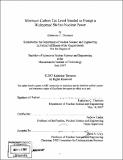| dc.contributor.advisor | Andrew Kadak. | en_US |
| dc.contributor.author | Thornton, Katherine C. (Katherine Claire) | en_US |
| dc.contributor.other | Massachusetts Institute of Technology. Dept. of Nuclear Science and Engineering. | en_US |
| dc.date.accessioned | 2008-05-19T16:08:45Z | |
| dc.date.available | 2008-05-19T16:08:45Z | |
| dc.date.copyright | 2007 | en_US |
| dc.date.issued | 2007 | en_US |
| dc.identifier.uri | http://hdl.handle.net/1721.1/41687 | |
| dc.description | Thesis (S.B.)--Massachusetts Institute of Technology, Dept. of Nuclear Science and Engineering, 2007. | en_US |
| dc.description | Includes bibliographical references (leaves 45-50). | en_US |
| dc.description.abstract | Carbon dioxide is suspected to be a major contributor to global warming. In the United States, nearly 70% of electricity is produced using coal or natural gas, both of which emit carbon dioxide into the environment. Nuclear power, which does not emit any carbon dioxide, produces 17% of the electricity consumed in the United States. In order to persuade utilities to switch from coal or natural gas to nuclear power and thus reduce carbon dioxide emissions, a carbon tax should be implemented. Depending on the cost of construction for new nuclear plants and the level of savings that will incentivize utilities to switch, the carbon tax needed to promote nuclear power will range between $20/tC and $200/tC. The full range of carbon tax scenarios are developed in this thesis, with the most likely carbon tax being $1 10/tC. This cost assumes a $1800/kw capital construction cost and a 10% risk perception premium on the bus bar cost of power to address the financial and industry community's somewhat negative perception of nuclear investments. From a policy perspective, this carbon tax will be more effective in causing utilities to move to nuclear power than a cap and trade policy. From a utility standpoint, switching to nuclear power under a carbon tax is less expensive than implementing a program of carbon capture and sequestration. | en_US |
| dc.description.statementofresponsibility | by Katherine C. Thornton. | en_US |
| dc.format.extent | 50 leaves | en_US |
| dc.language.iso | eng | en_US |
| dc.publisher | Massachusetts Institute of Technology | en_US |
| dc.rights | M.I.T. theses are protected by
copyright. They may be viewed from this source for any purpose, but
reproduction or distribution in any format is prohibited without written
permission. See provided URL for inquiries about permission. | en_US |
| dc.rights.uri | http://dspace.mit.edu/handle/1721.1/7582 | en_US |
| dc.subject | Nuclear Science and Engineering. | en_US |
| dc.title | Minimum carbon tax level needed to prompt a widespread shift to nuclear power | en_US |
| dc.type | Thesis | en_US |
| dc.description.degree | S.B. | en_US |
| dc.contributor.department | Massachusetts Institute of Technology. Department of Nuclear Science and Engineering | |
| dc.identifier.oclc | 221270356 | en_US |
